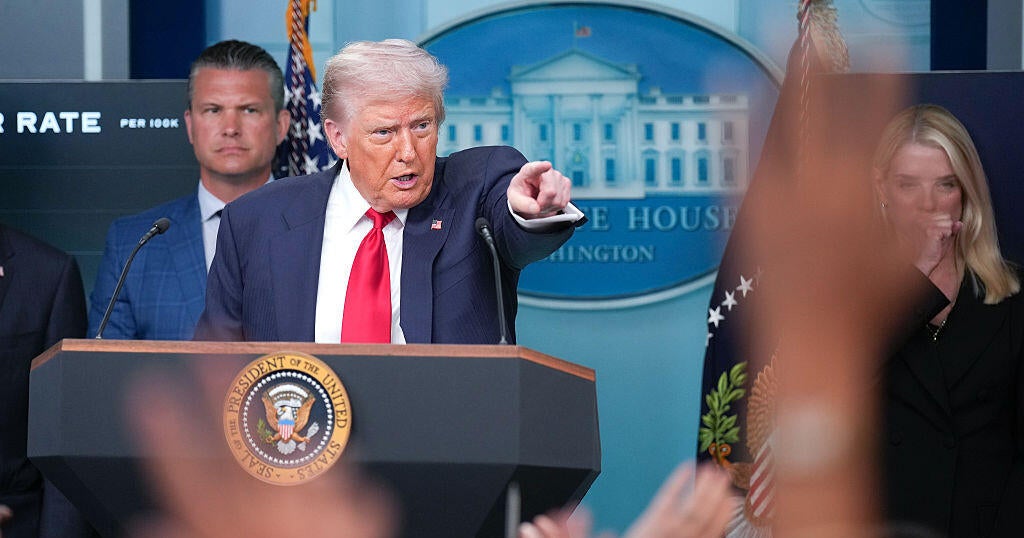Republicans block Democratic effort to increase direct checks to $2,000
House Republicans on Thursday blocked a bill by Democrats to provide direct checks of $2,000 to individuals on Thursday, after President Trump called on Congress to amend a newly passed coronavirus relief bill to increase direct payments to $2,000, with $4,000 for a couple. House Republicans blocked the proposal, which Democrats tried to pass by unanimous consent, but Speaker Nancy Pelosi said there will be a full House vote on the measure next week.
"Today, on Christmas Eve morning, House Republicans cruelly deprived the American people of the $2,000 that the President agreed to support. If the President is serious about the $2,000 direct payments, he must call on House Republicans to end their obstruction," Pelosi said in a statement Thursday morning. "On Monday, I will bring the House back to session where we will hold a recorded vote on our stand-alone bill to increase economic impact payments to $2,000."
Mr. Trump traveled to his Mar-a-Lago golf club in Florida on Wednesday evening, where he is expected to remain through the Christmas holiday. Pelosi said that she hoped Mr. Trump would sign the current relief bill passed by Congress this week to avert a government shutdown and provide badly needed support to suffering Americans.
The stimulus bill was flown to Florida on Thursday so it will be at hand should the president decide to sign it.
Democratic Congressman Richard Neal, the House Ways and Means Committee chair, introduced the Caring for Americans with Supplemental Help (CASH) Act on Thursday, increasing the direct payments to $2,000. House Majority Leader Steny Hoyer attempted to bring the bill to the floor by unanimous consent, but it was blocked due to opposition from Minority Leader Kevin McCarthy. Only one Republican, Congressman Rob Whittman, needed to be present on the House floor to block the bill.
Mr. Trump had indicated in a video posted to Twitter on Tuesday that he would not sign the $900 billion relief package passed by both houses of Congress on Monday. The package provides $600 in direct payments for adults making up to $75,000 per year and children, with $2,400 for a family of four.
The president's demand came after weeks of negotiations, with Treasury Secretary Steven Mnuchin playing an active part in determining the final numbers before the relief bill and an omnibus spending package passed with overwhelming majorities. By holding a voice vote on Thursday, Democrats will attempt to call Mr. Trump's bluff and force Republicans to go on the record for their opposition to increasing direct payments from $600 to $2,000.
Mr. Trump's potential refusal to sign the current bill could have dire consequences, particularly if Congress is not able to convene to override a possible veto until after Christmas. The bill renewed relief provisions set to expire at the end of the month, such as critical emergency unemployment programs and an eviction moratorium.
If these programs are allowed to expire, roughly 12 million Americans are set to lose unemployment benefits the day after Christmas. The bill also included an additional $300 per week in unemployment insurance; aid for small businesses; funding for testing, tracing and vaccine distribution; additional money to increase SNAP benefits; and aid for airlines and transportation.
Pelosi said in a letter to colleagues on Wednesday that Republicans had told her and Senate Minority Leader Schumer that they would be unwilling to accept direct payments above $600.
"In the bipartisan negotiations, Leader Schumer and I repeatedly asked Republicans what would be the highest number the President would accept for direct payments, and they responded with Sphinx-like silence. In the negotiations, they would never go above $600 and in some cases, proposed $500," Pelosi said.
Even if the House was able to pass the bill in the House next week, it is unlikely that it would pass in the Senate. GOP Senator Ron Johnson twice last week blocked proposals by Independent Senator Bernie Sanders and Republican Senator Josh Hawley to provide $1,200 direct checks. Johnson argued that spending money on direct checks would increase the deficit, and amount to "mortgaging our kids' future."
Republican Senator Lindsey Graham, a staunch ally of the president, said in a tweet Wednesday that he supports Mr. Trump's "demand to increase direct payments for long-suffering Americans to $2,000 per person." But it is still unclear whether McConnell would even bring such a bill to the floor.
Mr. Trump has also conflated the $900 billion relief proposal with the $1.4 trillion omnibus funding bill, criticizing some of the portions in the omnibus which his own administration had requested. In a letter to Republican colleagues on Wednesday, McCarthy said he will bring forward a bill to address Mr. Trump's concerns about the omnibus by unanimous consent, but it will likely be blocked by Democrats. Mr. Trump's refusal to sign the omnibus could also result in a government shutdown.
The previous bipartisan relief bill passed by Congress in March, the CARES Act, provided direct checks of $1,200 for adults and $500 for children. The House passed a massive $3 trillion relief package in May, the HEROES Act, which would have provided direct payments of $1,200 to adults and children, with up to $6,000 per household.
However, McConnell refused to bring the HEROES Act to the Senate floor, arguing that it was too large and contained too many provisions unrelated to the coronavirus. Mr. Trump also slammed the bill, saying that the inclusion of direct funding for state and local governments amounted to a bailout for blue states.
The House then passed a revised, $2 trillion version of the HEROES Act in October, which still included the direct payments. But McConnell still refused to bring the legislation to the Senate floor, and instead tried to pass a targeted $500 billion bill that did not include direct payments.





